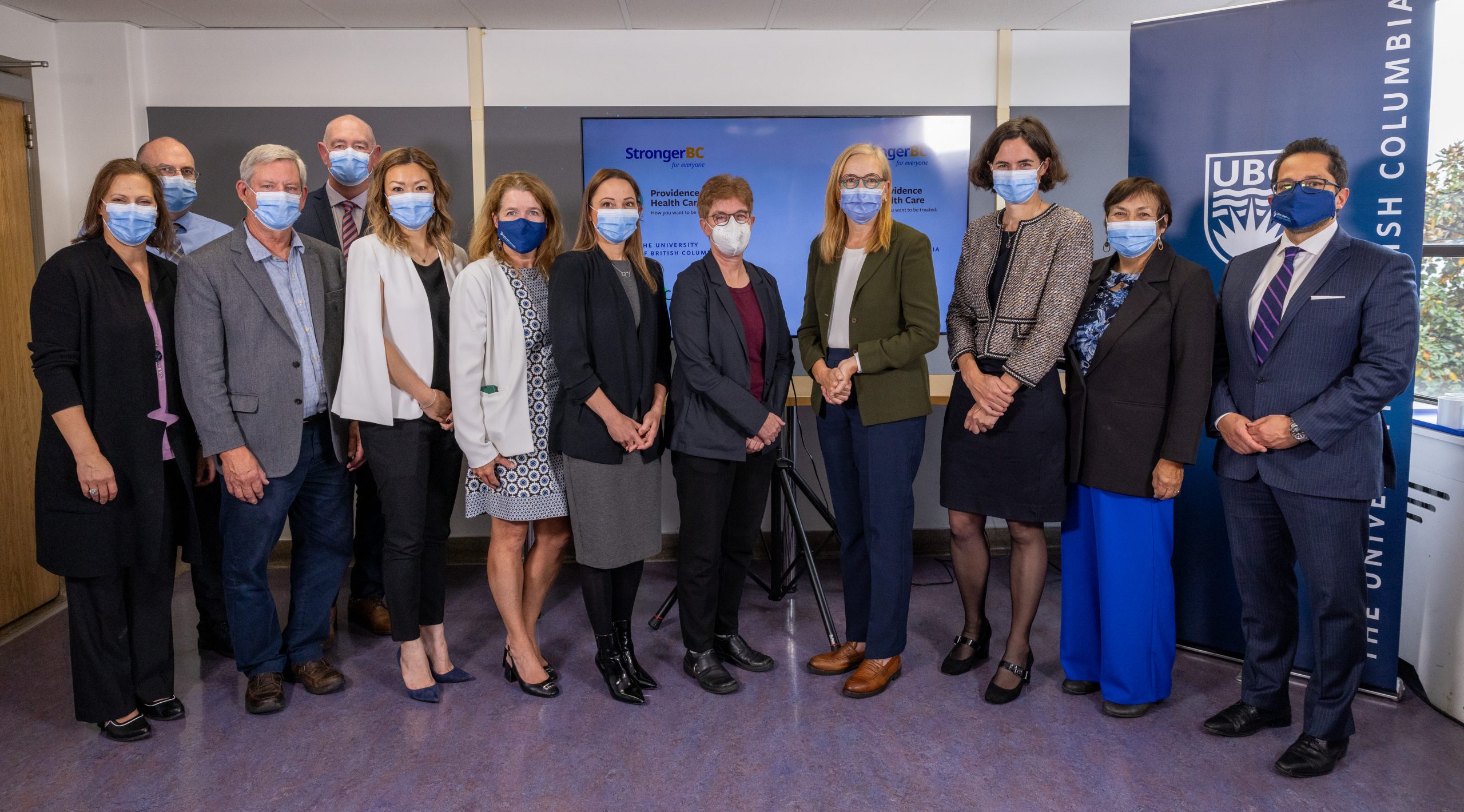
The Honourable Brenda Bailey (fourth from right) joined by members of B.C.’s life sciences community at the clinical trials announcement, including UBC’s Dr. Gail Murphy (fifth from right), Dr. Robert McMaster (third from left) and Dr. Michelle Wong (fifth from left).
On October 10, the Government of B.C. announced an expansion of the province’s clinical trial capacity that will enhance access to cutting-edge medical treatments for British Columbians and allow local researchers and biotech companies to test their discoveries within the province.
The announcement includes establishing a new research chair in clinical pharmacology and therapeutics within the UBC Faculty of Medicine, as well as creating a six-bed Phase 1 clinical trials unit (CTU) at Mount Saint Joseph Hospital, operated by Providence Health Care. It will be the only non-cancer Phase 1 CTU in Western Canada.
“This expansion of B.C.’s clinical-trial capacity will be transformative for the local life sciences ecosystem and for the health of patients in British Columbia and beyond,” said Dr. Dermot Kelleher, Vice-President, Health, and Dean, Faculty of Medicine, UBC. “By working closely with health researchers, local industry and international partners, UBC’s new research chair will accelerate the development and testing of innovative new drugs right here in the province, and strengthen our talent pipeline with skilled clinical researchers and trial investigators. Ultimately, this means British Columbians will have access to life-saving medical treatments sooner.”

Dr. Dermot Kelleher
The B.C. government is providing UBC with $2.4 million to support the establishment of the endowed chair. The chair will provide academic leadership for the new CTU and lead an integrated research and education program in clinical pharmacology. The chair will also work to establish a new residency training program in clinical pharmacology that will strengthen the talent pipeline of clinical researchers and clinical trial investigators in the province.
Clinical pharmacology is an emerging specialty that plays an important role in the design and evaluation of new drugs and in the delivery of all stages of clinical trials, from early-phase to late-stage trials. Clinical pharmacologists work in a variety of roles within academia, private industry, health care and regulatory agencies, with a focus on drug development, clinical trials, optimizing patient care and policy formation related to medication use.
“Growing B.C.’s capacity for clinical trials is not only going to further scientific advancement, it is going to save lives,” said Adrian Dix, B.C.’s Minister of Health. “By investing in the new clinical trials unit, we are paving the way for ground-breaking life sciences innovation that will advance health care in our province for years to come and help more patients in B.C. achieve better health outcomes.”
The new Phase 1 clinical trial unit is expected to be operational in late 2024, providing new opportunities for biotech companies and researchers to conduct Phase 1 clinical trials within B.C. This will benefit B.C.-based patients by allowing participation in trials for new therapeutics, and open doors for B.C.’s biotech companies to create more high-quality jobs and keep crucial intellectual property in the province.
“UBC’s new research chair will accelerate the development and testing of innovative new drugs right here in the province.”
Dr. Dermot Kelleher
“The new clinical trials unit will give significant opportunities for B.C.’s life sciences companies to keep their teams and intellectual property here at home,” said Brenda Bailey, B.C.’s Minister of Jobs, Economic Development and Innovation. “Successful clinical trials will also lead to new business agreements with pharma companies that will better position us to commercialize new, life-changing drugs and treatments for people in B.C. and around the world.”
Providence Health Care aims to include a purpose-built Phase 1 to 3 clinical trials unit in its plans for the envisioned clinical support and research centre (CSRC) directly adjacent to the new St. Paul’s Hospital at the Jim Pattison Medical Campus. The CSRC will be strategically designed as a dynamic life-sciences ecosystem, proactively driving research and development, strategic partnerships with industry and talent retention.
Michael Smith Health Research BC, the province’s health-research agency, will seek opportunities to leverage and support these initiatives as they contribute to a world-class destination for clinical trials. The agency will contribute an additional $1.2 million.
Learn more on the Government of B.C. website.